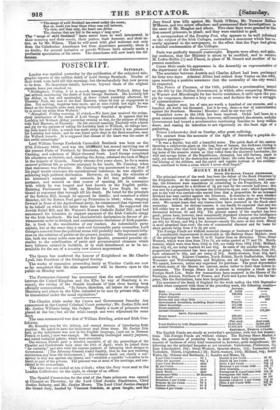POSTSCRIPT.
SATURDAY.
London was startled yesterday by the publication of the subjoined tele- graphic reports of the sudden death of Lord George Bentinck. Doubts of their truth were held till this morning; but the melancholy fact now proves to be true. No important details, however, beyond those of the original reports, have yet reached us.
"Nottingham, Friday, 9 45 a. m.—A messenger from Welbeck Abbey has just arrived, announcing the death of Lord George Bentinck. His Lordship left the Abbey, on foot and unattended, at three o'clock yesterday afternoon, for Thoresby Park, the seat of the Earl Manvers, where he had an engagement to dine. Not arriving, inquiries were made, and at nine o'clock last night he was found on the footpath quite dead, having evidently expired of apoplexy. Thores- by is about six miles from Welbeck." "Mansfield, Friday morning, 10 o'clock.—We have just received the melan- cholyintelligence of the death of Lord George Bentinck. It appears that his Lordship left Welbeck Abbey yesterday evening on foot, for the purpose of dining with Earl Manama, at Thoresby. On the servant reaching Thoresby with a horse and gig for the purpose of taking his Lordship back to Welbeck, no tidings hav- ing been heard of him, a search was made along the road which it was presumed his Lordship had taken; and he was found quite dead in the flood-meadows, near the Welbeck kennels. It is supposed that disease of the heart was the cause of this awful catastrophe."
Lord William George Frederick Cavendish Bentinok was born on the 27th February 1802; and was the fiftlilthild but second surviving son of the present Duke of Portland, by Henrietta, the sister of the Viscountess Canning, and coheiress of Major-General Scott. Lord George completed his education at Oxford; and, entering the Army, attained the rank of Major in the brigade of Guards. Nearly twenty-five years since, he for a season entered political life as private secretary to his uncle, Mr. Canning, when that statesman was Premier. Mr. Canning was accustomed to say, that if his pupil would overcome his constitutional indolence, he was capable of achieving high political distinction. However, on losing the stimulus of his kinsman's example and counsels, he fell into political unim- portance, and entered on that course of sporting life in connexion with which he was longest and best known to the English public. Entering Parliament in 1828, as Member for Lynn Regis, he con- tinued to represent that borough till his death. He voted for the principle of the Reform Bill, though he opposed its details; and remained a silent Member, till Sir Robert Peel gave up Protection in 1846; when, stepping forward in front of the Agricultural party, he commenced that vigorous war in its behalf on which his latter fame has been built. He supported •the Jewish Relief Bill, and Mr. Watson's Roman Catholic Relief Bill; and had announced his intention to support payment of the Irish Catholic clergy by the Irish landlords. His last characteristic declaration in favour of go- vernmental order in Ireland, and contemptuous disclaimer of Irish popular- ity, is fresh in the recollection of our readers. An indomitable party captain, but at the same time a rash and intractable party counsellor, Lord George's removal from the political arena will probably have important influ- ence on the relations of parties at the present juncture. His personal quali- ties, both the many noble ones and the few ignoble, presented peculiar ob- stacles to the combination of party and governmental elements which have hitherto existed in isolation, or in such detachment as to be un- available for the use of a country now almost ungoverned.


























 Previous page
Previous page